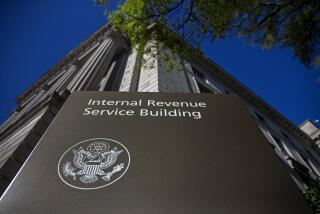No-Return Tax Plan Isn’t Feasible, IRS Study Shows
- Share via
WASHINGTON — President Reagan’s dream of a tax system in which most people wouldn’t have to file returns apparently is not to be. The Internal Revenue Service says it just isn’t feasible.
The idea, advanced by the President when he sent his tax-overhaul plan to Congress in May, 1985, would eventually have allowed most taxpayers to settle their accounts with the government simply by verifying the accuracy of a return prepared by the IRS.
A yearlong study “has led to the conclusion that it is not currently feasible to implement a return-free system which meets the desired objectives at a reasonable cost,” the IRS has concluded in a report to Congress.
“Under present conditions, large expenditures of resources would be needed to ensure that such a system would generate returns that were both accurate and timely,” the IRS said.
Would Delay Refunds
Among the problems with the proposed system:
--It would require most participating taxpayers to wait until early April to receive refunds. The IRS now mails more than 30 million refunds by the end of March each year.
--The change could make it difficult for taxpayers to meet deadlines for filing their state tax returns. Returns in most states must include a figure that is available only from the federal return.
--The inability of the IRS to compare information documents, such as statements of interest earned, with returns could result in generation of inaccurate returns by the agency. This document-matching process is one of the most effective compliance tools available under present law.
Wouldn’t Reduce Burden
Perhaps even more important, the IRS found that the system probably would not significantly reduce the paper-work burden on taxpayers.
Reagan had estimated that “by the early 1990s, more than 50% of all taxpayers could be covered by the return-free system. It is estimated that at this level of participation the return-free system would save taxpayers annually about 71 million hours in actual return preparation and $1.6 billion in fees paid to professional tax preparers.”
In its report to Congress, the IRS wrote: “Although participants would be relieved of the burden of filing returns, they would instead have the burdens of understanding the return-free tax system eligibility requirements, filing a postcard (to elect to participate), verifying the IRS report and notifying IRS of any discrepancies or disagreements.”
More to Read
Inside the business of entertainment
The Wide Shot brings you news, analysis and insights on everything from streaming wars to production — and what it all means for the future.
You may occasionally receive promotional content from the Los Angeles Times.










